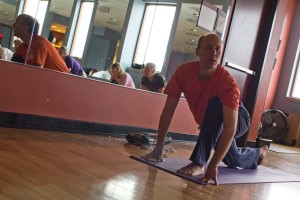Despite a demanding curriculum that calls for students to learn multiple instruments and prepare for in-the-moment performances, Ithaca College music students have found a new way to earn credit — staying silent.

Music students are now being offered Healthy Living for Musicians, a program that brings meditation instructors from the college’s Center for Counseling and Psychological Services and Island Health and Fitness to teach stress management and crisis prevention techniques. The sessions are sponsored by the Whalen Center for Music and as incentive, students can receive recital attendance for taking part in the sessions.
Nick Boyar, yoga instructor at Island Health and Fitness, leads some of the classes and introduced four short stress-reduction practices during his session Feb. 1.
Boyar then taught the class body-scanning meditation, a yoga technique where a person sits or lays down and moves his attention part by part through the body. He also distributes audio recordings of the techniques for students to use outside of the meetings.
Christy Agnese, assistant to the deans in the School of Music, said the program was inspired by student suggestions from the dean’s advisory council, a group of students who represent their respective studios regarding their main instrument.
Agnese said music students are often stretched in multiple directions with major requirements.
“Allowing our students to take a step back, learn how to de-stress, and also develop time-management skills is really key to their success here at Ithaca College,” she said.
Agnese said this program is especially important for relieving the tension tied into the constant demand for performance in front of one’s peers.
“Your classes usually involve lots of being called on in class, and asking to perform, like in sight-singing, where they might say, ‘It’s time to sing this. You, let’s go now,’” she said.
Katarina Andersson, a junior music education and voice major, said she takes 18 credits and hardly has time for mental recuperation.
“There’s so much that we have to do in our major, and there’s so little time we have to do healthy things, decompressing things, like meditation, or just going out, running and getting all the stress out,” she said.
Tristan Rais-Sherman, a senior cello performance major, attended a Healthy Living session Feb. 1. He said meditation is beneficial for a musician’s ability to work through the added sensations.
“You have to do so many things as a performer,” he said. “It’s so easy to get caught up in the adrenaline of the moment and the excitement and the fear of playing for people.”
Though the program is centered on music students, said the techniques are helpful for anyone undergoing external or internal pressures in their lives.
“Having the ability to relax oneself without relying on external conditions or substances, but to actually work internally is very important for everyone,” he said.
Paul Mikowski, a psychologist at CAPS, is one of the session conductors for the program. He said meditation is beneficial to all students, but it does have benefits that musicians can find fruitful.
“It helps with clearing your mind of distractions, reducing muscle tension that might get in the way of a performance,” he said.
To encourage a balanced mental state, Agnese said she hopes to expand the Healthy Living program in the future. The School of Music has already started to offer elective coursework in topics surrounding becoming a healthy musician. She said she hopes to integrate the sessions into all students’ lives as a shared requirement and not just an elective experience.
“When I was in college, the School of Music offered one session during your freshman year that had to do with kind of all these topics,” she said. “One 50-minute class to talk about all these topics — it’s just the very tip of the iceberg.”
Rais-Sherman said meditation helped him in musical performance.
“Being able to meditate and keeping yourself a little bit separated is really key,” he said. “It’s essential to collecting yourself and playing at your best.”




